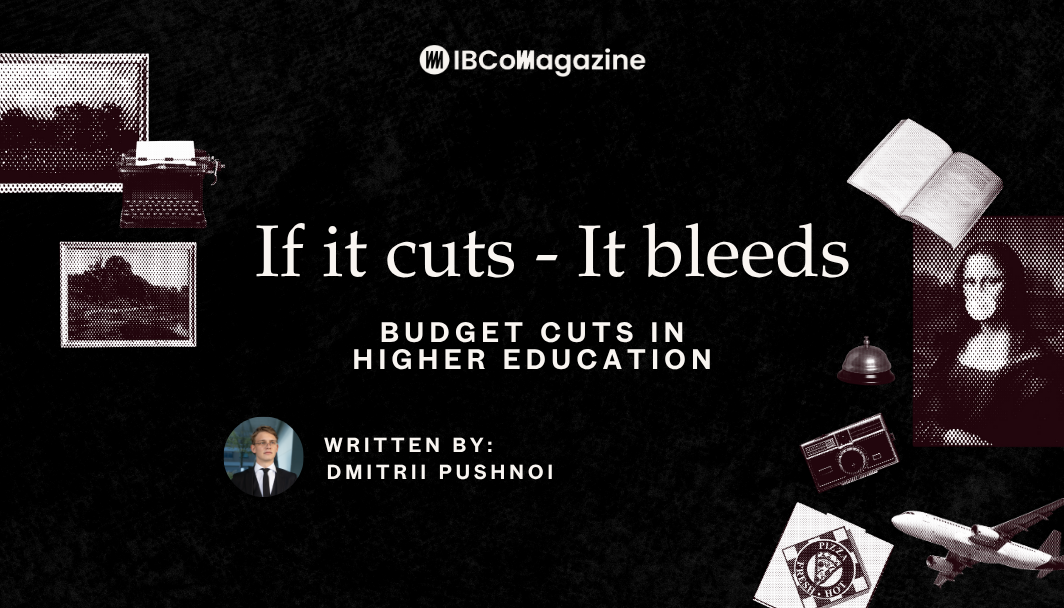Budget cuts have made waves across the campus last academic year and still echo through at our university[1]. With all the uncertainty, let’s attempt to clear up the situation as it stands. This article serves as a quick deep dive into the situation: through interviews and research on current university actions in Erasmus University Rotterdam[2] and University van Amsterdam[3], we’ll explore what to look out for – and what to avoid.
Cut, not in a literal sense
First things first: what are budget cuts? Budget cuts are not some malevolent evil curse or unexpected cataclysm. In most cases, they’re a necessary measure. According to vocabulary.com, “budget cuts” are defined as “the act of reducing budgeted expenditures”[4]. In other words, funds already allocated to a project are suddenly reduced.
Now that is a real issue.
Statements from the victims
Let’s see how different universities are coping with the issue and what they’re doing about it.
The University of Amsterdam has made statements regarding the cuts, saying that “joint protests are working”[5]. Thanks to the protests, the Dutch House of Representatives “passed a motion to reduce the budget cuts by €800 million”[6].
No further updates have been posted on the website regarding social or legal action, with the latest statement dating back to the 10th of June. Meanwhile, NL times further stated that the senate has approved the budget that “includes more than 400 million euros in additional cuts”[7].
Ellen van Schote, Vice-president of the Executive Board, released statements on behalf of the Erasmus University. Unfortunately, the main details concerning the cuts were not disclosed. There was, however, an approximation what to expect: “all support services have been instructed to cut back by 5%”[8]. Thus, we can expect infrastructure to suffer.
Furthermore, an concerning development regarding international students is to be expected: “We will have fewer international students”, says van Schoten.
Protests have thus proven to be effective. But what further actions are being taken in response to the cuts?
Averting our eyes, oh Landlord
One of the first immediate actions relates to rent.
According to Euronews, the average rent for an apartment in Amsterdam is currently around €2100, and between €1500 and €2000 euros in Rotterdam[9]. To put it in perspective, the average salary in Geneva is €7300, with a rent averaging €2100[10]. In the Netherlands, rent is taking up half your income. And it gets worse.
While Erasmus University Rotterdam has not provided specific details regarding lowering infrastructure, Amsterdam University has released a statement on the website, stating a “savings opportunity in the area of accommodation”[11]. It remains unclear what the future hold for future student accommodation, but current budget cuts do not indicate it will improve.
Survival of the fittest and the well-connected
Another pain point revolves around on-campus associations. In an interview with a former treasurer of ACE, the biggest cultural association of our university, some insights came to light.
Firstly, there are indeed cuts affecting associations. The scale of these can vary depending on how each association handles the negotiations[12]. It’s important to note that some adjustments can be discussed.
Secondly, the cuts have also created unexpected opportunities. Faculties have provided generous contacts and opportunities to the associations, including access to external networks and advice on securing additional funding beyond the university[13]. Reaching out to faculty is therefore strongly recommended. The best advice is to keep going and continue seeking opportunities — both within and outside the university.
Overall, the messaging should remain hopeful. A representative from Studium Generale commented on the cuts, noting the difficulties that have arisen. For example, most buildings now close at 18:00 due to the budget cuts. Yet, optimism persists, as they stated: “our goal is to be as accessible as possible to the students” [14].
[1] https://www.erasmusmagazine.nl/en/specials/budget-cuts-in-higher-education/
[4] https://www.vocabulary.com/dictionary/budget%20cut
[5] https://www.uva.nl/en/current/budget-cuts/timeline-of-actions-against-budget-cuts.html
[6] https://www.uva.nl/en/current/budget-cuts/timeline-of-actions-against-budget-cuts.html
[7] https://nltimes.nl/2025/10/28/senate-approves-supplementary-education-budget-400-million-euros-cuts
[8] https://www.eur.nl/en/news/ellen-van-schoten-our-universitys-approach-budget-cuts
[9] https://investropa.com/blogs/news/average-rent-rotterdam
[10] https://www.euronews.com/business/2025/07/22/can-you-afford-to-live-here-europes-cities-ranked-by-rent-to-salary-ratio
[11] https://www.uva.nl/en/current/budget-cuts/budget-cut-faqs.html?cb#What-will-the-UvA-cut-back-on
[12] Statement from live interview with former ACE treasurer, requested anonymous, has made a statement on how the meeting with the faculty went for them at the time and how it differs from association to association.
[13] Former ACE treasurer has detailed their experience by referring to crowd funding as one of the methods for securing additional funding, although warned against its utilisation if done haphazardly.
[14] Interview call with Studium Generale Representative, requested anonymous, has commented on current influences of cuts are not seen or vague, yet some limitations are already present. When asked about position to international students in ongoing events the answer was clear “our goal is to be as accessible as possible to the students”


